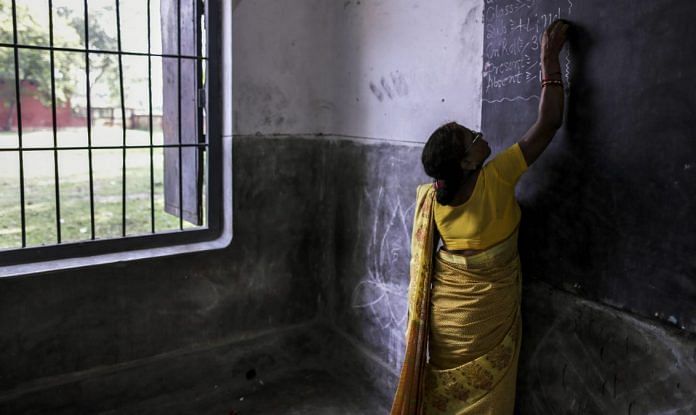Priya turned on her computer one day and an explicit montage of figures flashed on the screen. She looked at her 13-year-old son aghast – he had been browsing porn. For Indian caregivers, grappling with a child’s first interaction with sexuality is always a moment of truth. With major gaps in comprehensive sexuality education in the country, the internet serves as a key source of information for curious teens. However, adolescents are unlikely to find information online to help them navigate everyday reproductive or sexual health issues. In the current context, of a world isolated and disconnected by the Covid-19 pandemic, it is more important than ever to reach out to adolescents and ensure their physical and mental well-being is protected.
A 2016 study by the Indira Gandhi National Open University and Nirmala Niketan College reported that Indian teenagers are increasingly likely to be exposed to pornography at an earlier age than ever. As many as 82 per cent of parents said both girls and boys watched porn. A survey by the International Institute for Population Sciences and Population Council Youth of 50,848 married and unmarried young Indians found that nearly half the young women and one-sixth of the young men interviewed never received any information on sexual health. The study revealed limited awareness on most sexual health issues, including safe sex practices, Sexually Transmitted Infections (STIs), HIV, AIDS, and contraception.
The internet and popular media are among the leading sources of information on sexuality in India today. This increases teens’ risk of developing negative attitudes about managing relationships, bullying, sexuality, and gender relations and has led to stigma around sex education. The link between gender violence and lack of sex education has long been established.
Schools, when they do provide information to students, do so within the framework of a curriculum that lacks depth and accuracy. Several sex education programmes that are currently delivered in schools are located within a historical Adolescent Reproductive and Sexual Health (ARSH) framework that links the need for sexual and reproductive health information and services with family planning. This perspective rarely teaches sex education with an affirmative approach that celebrates both sexuality and diversity. While the primary mandate for addressing ARSH lies with the Ministry of Health and Family Welfare, no single government agency in India is responsible for ensuring the implementation of sex education. It’s also one of the major chapters missing from India’s new National Education Policy 2020.
Also read: Not woke on same-sex relationships, says Madras HC judge, wants ‘psycho-education’ session
It takes a village
There is wide variation in the approach to sexuality education followed in the states. According to the United Nations Population Fund’s report ‘State of World Population 2021: My Body Is My Own’, there are no laws, regulations or national policies for comprehensive sexuality education in India. Currently, most schools barely address topics beyond a description of the human reproductive system and physical changes at puberty. Teachers, like parents, are often ill-equipped to approach the subject and are apprehensive about the potential backlash from the parent community.
Population Foundation of India, a national NGO that promotes gender-sensitive health and development programmes, has developed a teacher-training tool – ARSH For You –to facilitate health discussions with adolescents about sexuality and relationships. ARSH for You is a critical component of Population Foundation’s latest digital initiative – Educately. Designed as a knowledge hub, Educately is a digital and open-access portal on information for adolescent health and well-being.
Tools like ARSH For You can go a long way in helping teenagers deal with the emotional and physical changes of puberty. It aims to equip educators, primarily, with the knowledge, skills, and attitudes to address reproductive and sexual health topics with adolescents effectively and empathetically. The curriculum explores power, sexuality, gender, diversity, consent, STI’s relationships, and violence, with low-cost interactive classroom activities like games and facilitation tips. The course delves into issues such as ‘power within relationships’ and provides key context for adolescents navigating new types of relationships with parents, caregivers and peers. The course includes exercises that teachers can use in classrooms to practically demonstrate how power dynamics work in traditional relationships.
ARSH For You sensitises teachers and parents about ways to include these topics in everyday discussions with adolescents. Adolescent health isn’t taught as a separate subject but is woven into the existing Biology and Physical Education curricula. For example, students are introduced to the concept of pubertal changes in the body and are made comfortable with the same by emphasising how normal the process is by drawing analogies from nature around us – changes in seasons, trees shedding their leaves and growing new leaves, etc. similar to a tree, which undergoes a lot of changes during its life-cycle, human beings and their bodies also change.
Also read: Young women are taking sex-ed into their own hands on YouTube
This programme is completely online, free of cost, and self-paced to suit educators’ different needs and availability and available in both Hindi and English. There are currently over 600 teachers from all over India who are enrolled in the programme.
“This course is a must for every teacher. It guides us on how to guide children properly. I am sure if every teacher studies and follows it, our students will have proper knowledge and awareness of sex in adolescence,” says Satish Kumar, who was one of the first educators to complete the programme.
Like most parenting issues, educating children about intimate relationships, puberty changes, growing up, and sex is a team effort. By empowering educators, we can ensure that adolescents get comprehensive and reliable information about navigating a challenging and formative phase of their lives.
Priyal Gulati is Senior Specialist-Digital Learning, Population Foundation of India. Views are personal.



